Prayer Books: Celebration and Commemoration
Throughout its long history, the synagogue commemorated historical events at regular and special services, and persons of note were honored with liturgical odes. The liturgy collection of the Library's Hebraic Section is rich in such special commemoration and celebration publications.
An aesthetically pleasing order of service, Simhat Mitzvah (Joy of the Commandment), celebrating the dedication of its new synagogue, was issued by the Italian congregation (the other was the Spanish and Portuguese) of Florence in 1793. On page four of the publication we note the presence of a choir and musicians, and special directions to their leader. This is a representative publication of the many others which celebrated dedications of synagogues, schools, orphanages, homes for the aged, and other communal institutions.
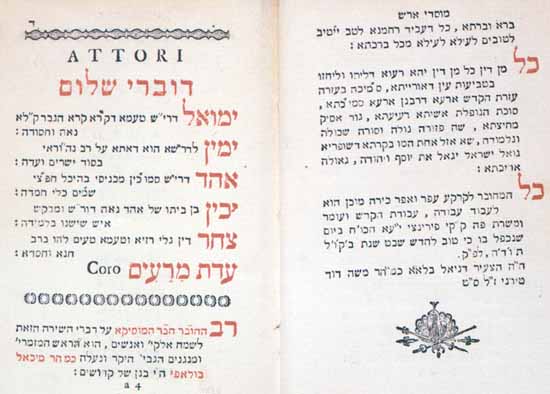 |
Of greater historical significance are the many special services, poems, and prayers published in praise or memory of non-Jewish persons of power-some, like Pope Leo X, deserving of Jewish praise; some, like Pope Pius VI, not. Maria-Theresa, honored by one of the most beautiful of liturgical publications, was surely unworthy of the praise showered upon her; while her son, Joseph II, Holy Roman Emperor and ruler of Austria and the north Italian provinces, was. In 1781 he abolished the Jew's badge, rescinded the poll tax, and issued his Toleranzpatent, providing for gradual elimination of restrictions against Jews and allowing them to enter the broader political and cultural life of his domains. "Toleration" was not granted but imposed, for in return it demanded a too rapid assimilation on the part of the Jews in the life of the society at large. Joseph II's attitude towards the Jews was that of a benevolent despot; to him they were human beings, consumers, and tax payers, useful, if kept in check. Jews were still confined to ghettoes, restricted in marriage rights, and forbidden to hold office; but the most humiliating edicts were removed, and opportunities for participation in educational and economic life were expanded.
In 1789 the Jewish community of Mantua seized the opportunity to express its gratitude to Joseph II by celebrating his army's success in the siege of Belgrade. It took the form of an elegant publication, L'Elohei M'uzim Roni Todot (To the Lord of Might Sing Gratitude), prayers and poems in Hebrew with Italian translation by Azriel Isaac Levi, rabbi and scribe of the Mantuan community, Rabbi Solomon Norsa, scion of one of the city's leading families, and Rabbi Abraham Cologna, who later gained fame as vice-president of the Sanhedrin convened by Napoleon in 1807.
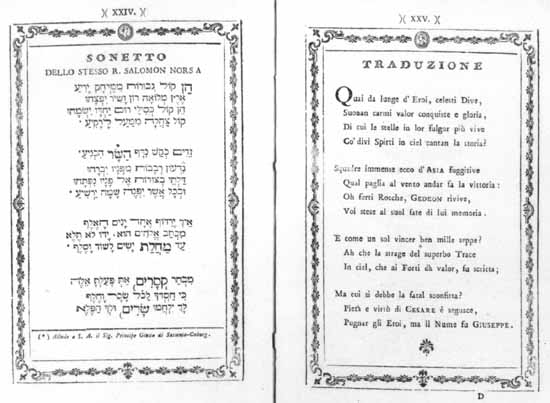 |
Napoleon's benevolence to the Jews was far greater. Ghetto walls fell, and he permitted the participation of Jews in political, social, and economic life. On August 15, 1808, the Jews of Livorno celebrated the emperor's birthday with special prayers in their Great Synagogue, and issued Hod Malchut (Glory of Sovereignty), an order of service in Hebrew with Italian translation, which culminated in a benediction for "His Imperial Majesty, Napoleon I, Emperor of France, King of Italy and Protector of the Confederation of the Rhine."
May the King of Kings place compassion in the heart of the Emperor and his counsellors and officers, to deal kindly with us, and with Israel our brethren. In his days and ours, may Judah be saved, and Israel dwell securely, and may the Redeemer come to Zion.
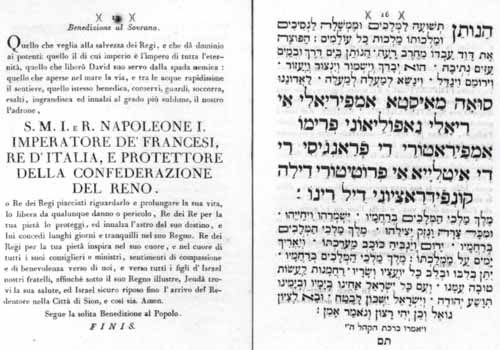 |
A special Order of Service and Prayer "for the Day of Assembly, devoted to mourning by the Jewish Congregations, throughout England" was published in London, for use on the 24th of Tamuz, AM 5590 (July 15, 1830), that "being the day of burial of His late, Most Gracious Majesty, King George IV." By all accounts George IV was a profligate, immoral, contentious king but, together with all other English subjects, the Jews gathered in their houses of worship to join in public mourning and announced their participation by issuing a two-page broadside containing the prayers recited.
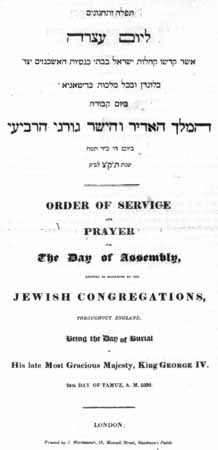 |
The supplications "for life and peace" for the newly crowned Bey of Tunis, Muhammad al-Sadiq-expressed by "the Jews dwelling under his sovereignty, here, in the city of Tunis," and published there in 1860 in Hebrew and Arabic-were genuine. His predecessors, Ahmad and Muhammad, treated their Jewish subjects with a benevolence unmatched in the Islamic world, the former so much so that he was called the "bey of the Jews"; the latter, under French pressure to be sure, issued a constitution which provided that duress may not be used to force Jews to change their faith, nor may they be hindered in the free observance of their religion. Jews had every reason to expect the new bey would continue these policies, hence, the prayers for his well-being, but a revolution in 1864 brought about abrogation of the constitution, and the Jews suffered both from revolution and abrogation. Only in 1881, when Tunis became a dependency of France, were its Jews accorded equal rights.
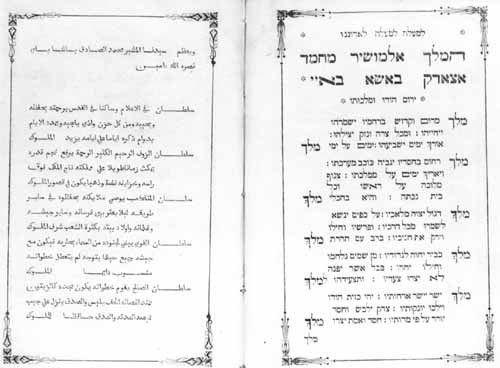 |
A collection of occasional prayers, written in Casale Monferrato in 1817, is one of a number of such collections in the manuscripts collection of the Hebraic Section. Under French occupation from 1799 to 1814, the Jews of that area were granted equal civil rights, which with the end of French rule were revoked. The ghetto, established in 1724, was reinstituted, and rights granted were rescinded. In 1817 the scribe, remembering fifteen years of freedom and equality now gone, inscribed the most mournful dirge in all the liturgy, Ele Ezkara, recounted on the Day of Atonement, with a full heart.
These things do I remember and my heart is grieved. How the arrogant have devoured my people! ... With humble and mournful hearts we pray to Thee, O merciful God, look down from heaven on the blood of Thy righteous. Oh make an end of bloodshed by man and wash away the stain, O thou King, who sittest on the throne of mercy.
It was not until 1848 that Jews were granted full emancipation.
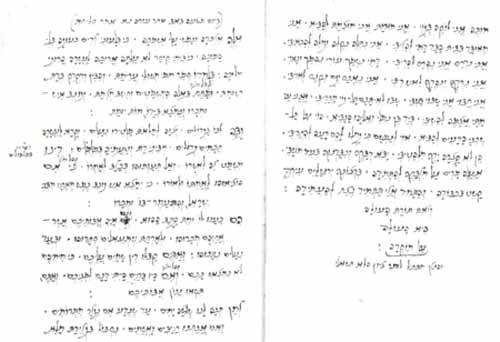 |
Sources: Abraham J. Karp, From the Ends of the Earth: Judaic Treasures of the Library of Congress, (DC: Library of Congress, 1991).


